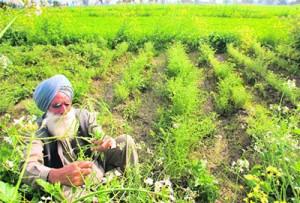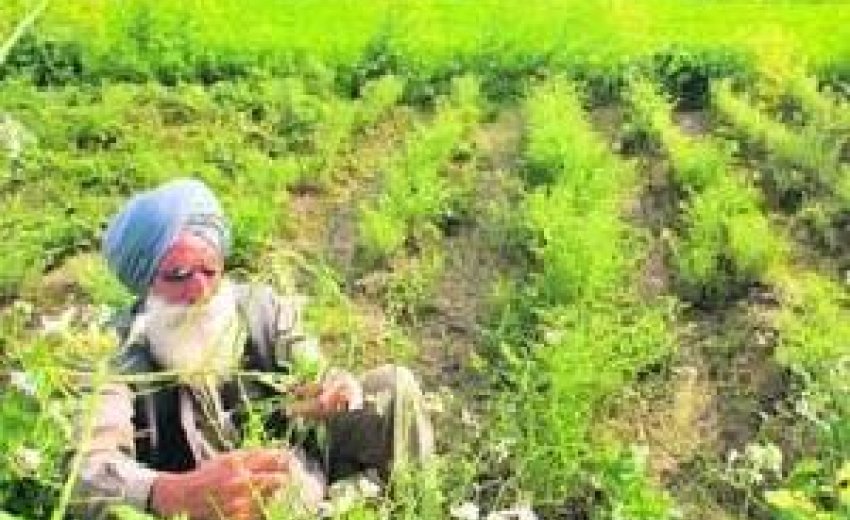 After the success of the Green Revolution and its accompanying lessons, the Punjab farmer is waking up to the benefits of organic farming, reports Jangveer Singh
After the success of the Green Revolution and its accompanying lessons, the Punjab farmer is waking up to the benefits of organic farming, reports Jangveer Singh
In Punjab, the ‘food bowl’ of India, where a high yield has always been the main pursuit of farmers, organic farming has never been a preferred option because of low output. But things have changed over the last few years, due to increasing awareness as well as preference for organically grown food, not only in many major cities, but also in small towns. Even farmers know that these organically grown crops are not a health hazard.
The organic movement in Punjab has many home-grown components as many social activists as well as NGOs are working for a change in their homeland. Though many activists from other states, too, are flocking in, appalled at the high suicide rates and health problems being faced by the farmers of India’s food bowl.
A serious debate is presently on, following the publication of a paper “Organic farming and its necessity – how far it can go” by the Punjab State Farmers Commission in December last year. However, the farmers of Punjab are yet to give their verdict on the issue. Although the yield-loving farmers are still sticking to intensive farming or ‘chemical farming’ as organic adherents call it, but many ‘chemical farmers’ are now also experimenting with organic crops.
Novel concept
One such NGO is Kheti Virasat, which started the Nabha organic cluster in 2000. It is providing real time as well as extension service to farmers wishing to go organic. Meeting the organic farmers of Nabha is like meeting converts to a new religion. They have been armed with light traps (to trap flies), pheromone traps (to stop harmful insects from mating), trico-derma cards (to help friendly insects), vermin composts and mixtures of neem and dhatura to tackle pests. However, their mainstay is jeevamrit, a mixture made from the dung and urine of indigenous cows, jaggery and gram flour. These ingredients are mixed with water during irrigation of crops. This mixture is also sprayed on plants during the growing stage.
Seventy-nine year old Balwant Singh of Khanora village is one of the first farmers in Patiala district to opt for organic farming. “People try to discourage you but you have to override this negativity to start off on the road to self-discovery,” he says, adding he grows organic produce on six acres. “It is booked in advance in the Gobindgarh market. I get 72 quintals of wheat from five acres. Although the yield is not much, but still it has been difficult to save enough even for my own consumption,” he adds.
A Saholi village resident Inderjit Singh, who has been a successful intensive farmer, says he also started organic farming on five acres. Inderjit has two Sahiwal indigenous breed cows and gives away jeevamrit, free of cost, to neighbouring farmers. Inderjit says the possibility of yield reduction should not be made an issue while opting for organic farming. “In future people may start getting more from organic farming than they do from chemical farming. Yield in chemical farming is also decreasing despite an increase in the use of fertilisers and pesticides. So the farmer has to be presented with an alternative.”
The organic cluster in Nabha is continuously adopting new practices. The cluster also believes in the science of ‘bio-dynamics’ with farmers planting crops according to the different phases of the moon. Ram Singh of Labana Tikku village claims that this sowing pattern gets him a better yield. Kheti Virasat director Surinder Singh says presently 246 farmers are cultivating more than 447 acres, which have been certified for organic farming. The Nabha foundation, headed by the late Maharaja’s grandson Uday Khemka, has borne the expenses for getting the certification.
Kheti Virasat is selling organic milk and vegetables to consumers in Nabha at only 25 per cent more price than that of conventional products. “We have contacted Vishal mega mart and Reliance for the purpose and also propose to start processing plants to add value to our organic produce,” adds Surinder.
Social movement
Unlike in Nabha where the organic farming is aimed at the market, the organic movement, also known as ‘natural farming’, started as a social movement in the Bathinda belt. It was aimed at making farmers aware of the hazards of “chemical farming’ following news reports of farmers boarding trains to get treatment for cancer.
Umendra Dutt of the Kheti Virasat Mission (KVM), which is spearheading this movement, is of the opinion that farmers alone can bring in the change in farming practices. The mission claims it has reached 400 villages with the farmer strength in each village ranging between two and 70.
Dutt says his organisation is against certified organic farming being thrust on the farmers by some other organic farmer organisations as well as the Punjab Farmers Commission. “For us, farming is an issue of livelihood, sustainability, ecology and agricultural sovereignty. I have to rid Punjab of this poison. Bhad me gayi market (the market can go to hell). It (market) will come afterwards,” is how he puts it.
The KVM leader says he would not like to go in for certification, which has corporate control. Dutt advocates the participatory guarantee scheme method of certification. He says under this method it would be the responsibility of village-level committees to give certificates, which could be verified by district-level and state-level committees. “This system will have more checks and balances and will be stronger than any MNC certification,” he says, adding, “The International Federation of Organic Farming (IFOM), too, has accepted this model.” Dutt, who regularly conducts drives against the use of pesticides in the Malwa region, says in Indonesia 56 pesticides were banned in one day. He says even if this cannot be replicated in Punjab, the government should at least give a time-frame of two to three years for this to happen. He claims that Rs 12,000 crore is being given to Punjab farmers by the way of subsidies to purchase pesticides, which about one-third of the state’s total budget.
Kavita Kuruganti, a volunteer with the KVM, says it is unfortunate that business interests have crept up into organic farming (certified farming) which has made it expensive. Kuruganti says there is a need to make the farmer realise that if he himself brings down the input costs then only can his exploitation through a rigged market be brought down.
Litmus test
The two men behind the report of the Punjab State Farmers Commission, which advocates organic practices for vegetables and milk production but says these practices may be counter productive for wheat and rice due to their effect on yields, are sticking to their guns. They have decided to check the yield claims of organic growers for the coming rabi season besides analysing jeevamrit scientifically. Dr Karam Singh says the claimed efficacy of jeevamrit, as a source of nutrients, will be put to test by Punjab Agricultural University, Ludhiana. While admitting that jeevamrit is a rich source of microbes, he said he had doubts whether it could provide the needed nutrients. “A Punjabi farmer puts in 60 kg of nitrogen in his field. Whether jeevamrit can replace this has to be tested,” he added. Dr Karam Singh claims a reasonable yield of rice is possible through organic farming but it is not possible for wheat and maize. “In winter, the availability of nitrogen decreases. Only if you put the recommended fertiliser, will you get the results or else the yield will decrease by 30 to 35 per cent.” He said the decomposition of organic matter also slows down in winter.
There is scepticism about the claims of organic growers among agricultural scientists. “If organic farming can ensure the same yields as those achieved with intensive farming, and can improve the quality of the produce and reduce input costs, then why are Punjabi farmers not taking to organic farming en masse,” asks Dr Karam Singh. He said marketing was another major issue and it was to be seen whether organic produce would continue to fetch the prices being demanded at present.
Dr J S Kolar, paper’s co-author, who visited organic fields in March last year, says the state of the crop did not look as if it would give the yield ,being projected by organic farmers. “The organic farming is okay for virgin land but not land under the wheat–rice cultivation. Also the call by organic proponents to use cow dung of only indigenous cows could also affect the milk productivity.”
